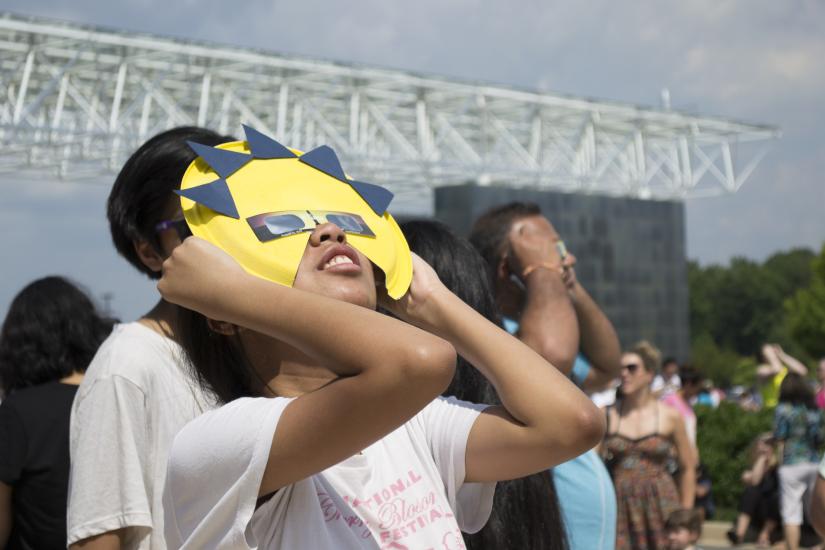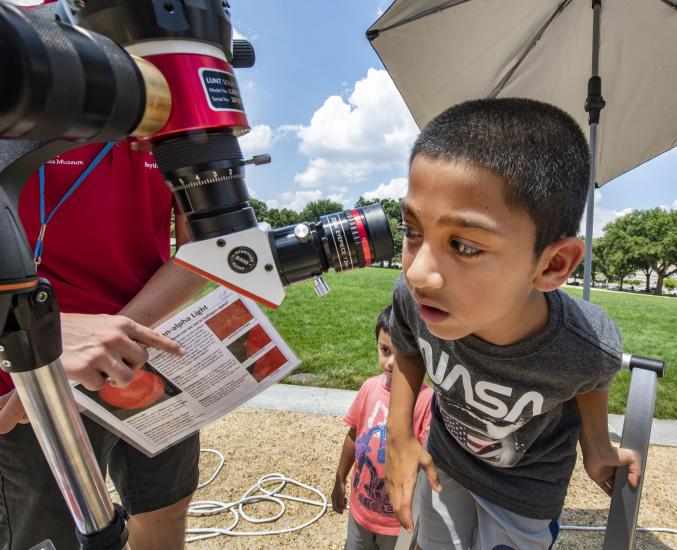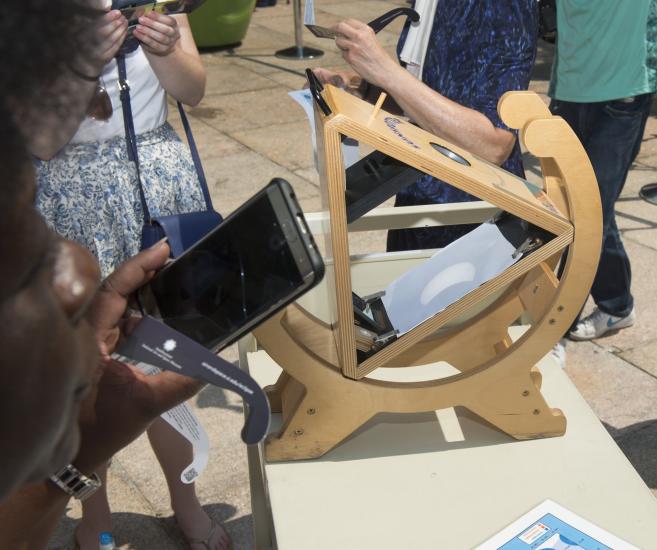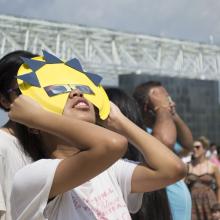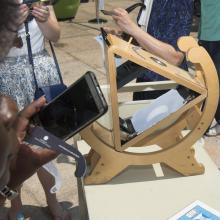Media Inquiries
Public Inquiries
The Smithsonian’s National Air and Space Museum will serve as a major source of information, educational activities and experiences on and around the total solar eclipse taking place April 8. The next total solar eclipse will not be visible in the contiguous United States for over 20 years.
The museum will hand out eclipse glasses to the public in advance of the eclipse, host eclipse-viewing opportunities and other events in the lead-up to the eclipse and provide eclipse-related resources for educators and parents/caregivers across the country.
Solar Eclipse Glasses
Beginning in late March, the museum will hand out limited supplies of solar eclipse glasses at the National Air and Space Museum in Washington, D.C., and its Steven F. Udvar-Hazy Center in Chantilly, Virginia. Glasses will also be handed out on the National Mall during the eclipse April 8. Solar eclipse glasses are provided by the National Oceanic and Atmospheric Administration (NOAA), the U.S. National Science Foundation (NSF) and NASA. The museum will share full details on how to pick up a pair solar eclipse glasses on its website March 15.
Eclipse-Viewing Events
On April 8, the museum will host the “Solar Eclipse Festival on the National Mall” in Washington, D.C. This event, presented in collaboration with other Smithsonian museums, NASA, NOAA, NSF and the National Radio Astronomy Observatory, will run from noon to 4 p.m. Attendees will be able to participate in many activity stations and view the sun using a variety of safe telescopes. A limited supply of solar eclipse glasses will be available for event attendees. “Solar Eclipse Festival on the National Mall” is made possible by the support of Phillip N. and Mary A. Lyons.
Visitors will also be able to view the eclipse through safe solar telescopes at the museum’s Steven F. Udvar-Hazy Center in Chantilly, Virginia, from 2 to 4 p.m. For those not in the Washington area, the museum has compiled a map of eclipse-viewing events taking place at Smithsonian Affiliates across the United States. The map features over 15 events, with additional events being added.
Other Eclipse Events
The museum will also host events in the lead-up to the eclipse to teach learners of all ages about the sciences of eclipses and get them excited about this rare celestial event. The museum will host the “Get Ready for the Solar Eclipse Family Day” April 6 from 10 a.m. to 2 p.m. at the museum’s location in Washington, D.C. Attendees can participate in eclipse-related activities and pick up a pair of solar eclipse glasses. The event is free, but timed-entry passes are required and can be reserved on the museum’s website. Virtual family activities (launching April 5) will be available for those unable to attend in person. “Soar Together at Air and Space” family days are made possible by the support of Northrop Grumman.
During the month of April, the museum’s “Flights of Fancy Story Time” series will be eclipse themed, featuring a reading of the children’s book Eclipse by Andy Rash and a hands-on activity to make safe eclipse-viewing tools. Eclipse-themed story times will take place at the museum’s location in Washington every Thursday in April at 11 a.m., at the Steven F. Udvar-Hazy Center in Chantilly every Tuesday and Thursday in April at 11 and 11:30 a.m., and virtually on Zoom April 5 at 10 a.m. Additionally, a video story time will be released on the museum’s YouTube channel March 19. “Flights of Fancy Story Time” is made possible by the support of the Conrad N. Hilton Foundation.
On March 26 at 6 p.m., the museum will host “What We Do in the Shadow: The Total Solar Eclipse Experience” at Washington’s Shaw (Watha T. Daniel) Neighborhood Library. Curator Samantha Thompson will talk about the experience of a solar eclipse: what happens to the natural environment during totality, how and why people travel to see one and what people see when viewing an eclipse. Attendance is free, and advance registration is not required.
Virtual Eclipse Resources
The museum also has available on its website educational resources that teachers, parents and caregivers can use to teach children about eclipses. This includes hands-on activities, videos and materials that can be incorporated into lesson plans. Astronomy education is made possible by the support of Thomas W. Haas Foundation, Otto Haas Charitable Trust, The Waterman Trust and Wyncote Foundation.
The museum’s “AirSpace” podcast will release an episode about eclipses March 13. The episode will look back at an 1142 eclipse that served as a sign to the Seneca to join the Haudenosaunee Confederacy, one of the oldest democratic governments, also known as the Iroquois League or the League of Six Nations. “AirSpace” is made possible by the support of Olay.
On April 2, the museum will release an eclipse-themed episode of “STEM in 30,” its Emmy-award winning educational webcast series for middle school teachers and students. Each episode of “STEM in 30” is accompanied by learning standards and teacher tips for incorporating it into classrooms. “STEM in 30” is made possible by the support of Boeing, Hexcel and Safran.
The museum is also selling limited-edition merchandise celebrating the solar eclipse. Items such as T-shirts, posters and mugs can be purchased for a limited time.
Full details about all of the museum’s eclipse activities and important information about how to view eclipses safely can be found on its website.
The National Air and Space Museum in Washington, D.C., is located at Sixth Street and Independence Avenue S.W. and is open every day except Dec. 25 from 10 a.m. to 5:30 p.m. Admission is free, but timed-entry passes are required to visit. The Steven F. Udvar-Hazy Center is located in Chantilly, Virginia, near Washington Dulles International Airport and is open every day except Dec. 25 from 10 a.m. to 5:30 p.m. Admission is free, timed-entry passes are not required, and parking is $15.
# # #
Note to editor: National Air and Space Museum experts are available for expert interviews about the science of eclipses, the history of eclipses and the museum’s eclipse programming. Interviews can be scheduled by contacting Alison Wood at WoodAC@si.edu or 202-633-2376, or Amy Stamm at StammA@si.edu or 202-633-2392.
